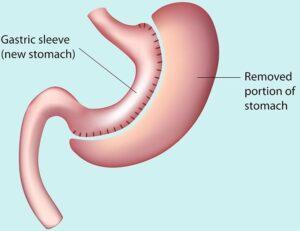Gastric sleeve before and after 3 months -this timeline signifies a courageous leap towards a healthier lifestyle for individuals. It's not just about weight loss; it's a journey that encompasses profound changes in one's physical health, dietary habits, and overall well-being. This transformative phase is filled with challenges and triumphs, each playing a crucial role in the journey towards a revitalized life. As we explore this journey, we'll uncover the myriad of ways in which gastric sleeve surgery impacts individuals in the short term and sets the foundation for long-lasting health benefits.
This transformative journey reshapes your body and redefines your relationship with food and self-image. In this comprehensive blog, we will explore the gastric sleeve before and after 3 months of experience, shedding light on the physical, emotional, and lifestyle changes that accompany this life-altering procedure.

During gastric sleeve surgery, sometimes referred to as sleeve gastrectomy, the stomach is surgically excised in an effort to lose weight. What's left is a tube-shaped stomach that resembles a banana in size and form. This decrease in stomach capacity helps you feel fuller faster by restricting the quantity of food you may eat.
People opt for gastric sleeve surgery for various reasons, including battling severe obesity, improving health conditions such as diabetes and high blood pressure, and enhancing overall quality of life. The success of this surgery heavily relies on thorough preparation and diligent post-operative care.

The decision to undergo gastric sleeve surgery is deeply personal, often coming after years of struggling with obesity and its associated health risks. Consulting with healthcare professionals and setting realistic goals is crucial in mentally preparing for the changes.
Preparation involves significant dietary changes, lifestyle adjustments, and ensuring a solid support system is in place. Physical and mental health assessments are essential to address any related issues that could affect the surgery's success.
It's normal to feel anxious or have concerns about the surgery. Dealing with societal stigmas and managing expectations is part of the preparation process, helping to set a foundation for realistic goals and a successful outcome. Also, gastric bypass surgery cost is a vital consideration.

In the timeline, remarkable physical changes occur. Most patients start to see significant weight loss, changes in eating habits, portion control, and an increase in energy levels and physical activities. The gastric sleeve before and after 3 monthsgastric bypass before and after pictures skin will be good proof.
The surgery can lead to a substantial boost in confidence and self-esteem. Coping with body image changes and enjoying the mental health benefits of weight loss are crucial aspects of the post-surgery experience.
Challenges such as dealing with cravings, emotional eating, and plateaus in weight loss are common. Maintaining long-term success includes staying committed to a healthy lifestyle and seeking support when needed.

The journey through weight loss surgery is marked by significant milestones that signify more than just numbers on a scale. These milestones often manifest as notable improvements in health indicators-such as reduced blood pressure, better-controlled blood sugar levels, and improved cholesterol readings.
Beyond these, encouragement and positive feedback from family and friends are crucial to reinforcing the sense of achievement. Moreover, celebrating non-scale victories, such as fitting into a smaller clothing size, noticing increased physical stamina, or even enjoying a favorite activity easily, is essential. These victories serve as potent reminders of progress, fueling the motivation needed to continue on this transformative path.
The aftermath of weight loss surgery brings about profound changes in one's quality of life, changes that extend far beyond the physical aspects. Relationships often see a positive shift as individuals gain more confidence and energy, enabling them to engage more fully with those around them.
Productivity in personal and professional arenas tends to increase, reflecting heightened energy levels and improved mental health. Embracing a healthier lifestyle-characterized by balanced eating, regular physical activity, and mindful living-becomes a necessity and a cherished part of daily life. This holistic improvement is a testament to the fact that the benefits of such surgeries go well beyond weight loss, touching every facet of an individual's existence. However, if you wish to know about gastric bypass surgery cost, the clickable link can help you.
As you progress beyond the initial post-surgery phase, the setting of new fitness and wellness goals becomes paramount. These goals are not just about maintaining weight loss but about pushing boundaries and exploring new possibilities for your health and happiness. Your commitment to continued self-care, encompassing both physical and mental well-being, is crucial.
This commitment may involve setting regular fitness challenges, exploring new dietary interests that support ongoing health, or even engaging in activities that nurture mental and emotional growth. Sustaining the positive changes brought about by the surgery requires not just discipline but a renewed passion for life and its possibilities. It's about building upon the foundation laid in the early days post-surgery and continuously striving for a life filled with health, vitality, and fulfillment.
As we reflect on the gastric sleeve before and after 3 month s journey, it's evident that this period marks the beginning of a profound transformation. The initial months post-surgery are not just about the weight lost but about the milestones achieved, the habits formed, and the new outlook on life. This journey is a testament to resilience, a reminder that with dedication and support, individuals can overcome challenges to embrace a healthier, more fulfilling future. Let this exploration serve as a beacon of hope and a source of inspiration for those considering 20 years after roux-en-y gastric bypass or embarking on their own gastric sleeve journey.
Recovery varies but generally involves a phased approach to diet, starting with liquids and gradually introducing solid foods, along with pain management and activity restrictions.
Yes, but in significantly smaller portions. The diet progresses from liquids to pureed foods, soft foods, and finally to regular foods, focusing on protein-rich and low-carb options.
Significant weight loss can be observed as early as three months post-surgery, with continued progress over the following months and years.
The main risks include leakage from the stomach line, nutritional deficiencies, gastroesophageal reflux, blood clots, and, in rare cases, surgery-related complications.
Gastric sleeve surgery typically takes one to two hours to complete.
Gastric sleeve surgery is generally considered permanent because a large portion of the stomach is removed. However, in some cases, it can be converted to another type of weight loss surgery if necessary.
The success rate varies, but studies show that most patients lose 50-70% of their excess body weight within two years after surgery, significantly improving obesity-related conditions.
Weight loss varies by individual, but on average, patients may lose 20-30% of their excess weight in the first three months after surgery.
Post-surgery, you'll follow a staged diet starting with clear liquids, then moving to pureed foods, then soft foods, and finally transitioning to solid foods, focusing on high-protein, low-carb, and low-sugar choices.
It's recommended to wait at least 18 months after surgery before becoming pregnant. The surgery can improve fertility and reduce pregnancy-related complications, but nutritional intake must be closely monitored.

